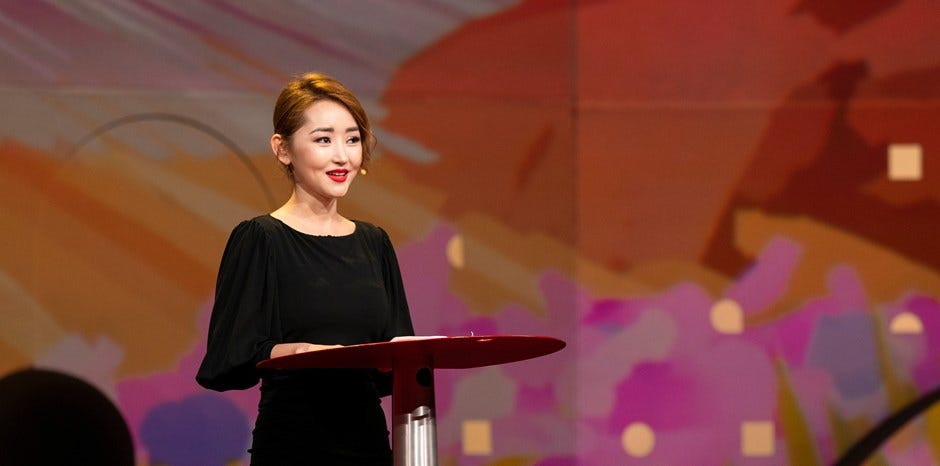Book review: While Time Remains
What a North Korean defector can teach us about western society
I started to believe, as I still do now, that the only way to think for yourself is to ignore the mainstream media, and largely forget the daily news cycle, and connect instead with the great minds of the past, who know all of our problems better than we do ourselves. There is a reason why the great books of Western civilization are all banned in dictatorships.
I won’t bury the lead: While Time Remains is the best book I’ve read this year. I expected good, I got superb. Yeonmi surprised me with the depth of her thinking and her dexterity in boiling a lifetime’s knowledge till only the concentrated wisdom remains. At the inauspicious age of 29 Yeonmi thinks and writes like an author three times her age, and the book is riddled with fascinating observations and unique insights. Here are a few that stood out to me…
If you’ll indulge me in generalization I’d like to propose that there are two kinds of bravery.
Induced bravery
Voluntary bravery
Induced bravery: climbing the mast in high seas to hack off a busted sail so your 18th century schooner doesn’t capsize in a tempest. There is character strength in performing this act (or any other like it) but I don’t find induced bravery to be the most impressive. When you must do a thing or you’ll die, it doesn’t leave much room for virtue.
Voluntary bravery is a whole different can of tuna fish. A person who has the leisure to choose the easy way, but does the brave thing even though it’s harder and riskier, well I find that to be remarkably impressive.
After becoming a US citizen Yeonmi Park had the opportunity to secure a lucrative income and enviable status among the elites. She was invited to speak at Jeff Bezos’ campfire event, and some of her videos that went viral ensured that event organizers were tripping over themselves to get her on stage. Yeonmi could have gone on the speaking circuit parroting pleasant platitudes so the millionaires and billionaires could feel like they’re saving the world by paying $5,000 to hear the poor (although increasingly rich) North Korean woman expatiate on the ghastliness of her native land.
Instead, Yeonmi elected to be voluntarily brave. She left the Met Gala before the after party, she refused to shut up about communist China’s concentration camps, she spoke publicly about what she knew to be true and her refusal to moderate her message cost her hundreds of thousands if not millions in potential income. That’s bravery for you, and I have a tremendous admiration for her decision.
Democratic People's Republic of America
Recently someone told me that I’m too cynical in my writing. Well, I reflected, that’s a fair point! If you only know me from Substack you might not guess that I’m actually a happy and positive person. Cognizant of injustice, incompetence and a corrupted first amendment, but I don’t let the cronyism get me down too much.
No matter how disabled our society and the circus show that is modern politics, is there any age when you’d rather be alive? Living 200 or 2,000 years ago means surgery without anesthesia, dying from painful diseases because there’s no soap and hauling water by hand. Have you ever picked up a bucket of water? It’s fucking heavy!
So in a magnanimous display of literary positivity I’m not going to dwell too deeply on the cancerous creepers of authoritarianism that Yeonmi exposes in our society. Instead, I’ll let Yeonmi speak her mind and you can interpret her message as you see fit.
Let’s begin with education, where we find Yeonmi discussing the sophisticated grading system employed by her local kindergarten Columbia University.
We had to be diligent in being woke—learning to locate the white male Bastards behind every crime, beneath every problem, in the air we breathed—otherwise we were no better than those who intentionally perpetuate social injustices. Luckily for receptive students, it was easy work. The questions were always predictable, the anwers always prefabricated. Students were expected to repeat teachings, not to explain material. We were to memorize and recite, not to grapple or understand. The difference between a passing grade and a stellar one was not accuracy or creativity, but passion and intensity. The difference between between a passing grade and a failing one lay in a refusal to criticize the usual targets (capitalism, Western civilization, white supremacy, systemic racism, oppression of minorities, colonialism, etc.).
Speaking of not learning things, Yeonmi is not favorably disposed to the rote regurgitation techniques used to condition the young.
Even in democracies, the classroom provides a captive audience of impressionable minds to a state-sanctioned hierarchy, from which information flows in only one direction. Students are expected to receive ideas, not to wrestle or come up with them, and to internalize what they learn there for the remainder of their adult lives. When students sit patiently as “learnings” are dictated to them, and they’re asked to memorize and regurgitate them by rote, it doesn’t strike us as odd so long as the “learnings” are in math, biology, English, or American history. But all you have to do is change the material itself to “Kim Il Sung Thought,” and you can see the problem.
Thankfully, critical thinking is not a skill that one must be born with. For those willing to make the effort, cognitive engagement is a technique that can be learned.
It took a long time for me to start thinking for myself, rather than within the boundaries set for me. For the first fourteen years of my life, which is when we learn how to think, there was no thinking for me to do. What kind of haircut should I get? That was a decision made only by the regime. What kind of music should I listen to? The regime decided for us. What kinds of books and movies? The regime, again. There was no opportunity to develop critical human faculties like judgement, imagination, or taste, which of course is the objective of every dictatorial regime.
And one hopes the populace does engage in critical thinking, because a people who believe everything they’re told are like an open wound on the battlefield, receptive to infections of authoritarian rule and groupthink.
When I lived in North Korea, I was brainwashed to believe that the Kims were starving just like us, simply because that’s what I was taught from a young age. It wasn’t until a friend in South Korea pointed out to me that Kim Jong Il had a big, round belly that I realized he couldn’t possibly be starving. Quite literally, I had to be taught to use reason to deduce that Kim Jong Il was in fact fat, even though a baby could have seen it. That’s why the subversion of critical thinking is so dangerous. It is the mechanism by which humans lose their faculties as individuals and succumb to groupthink.
A new view
There is the oft cited joke about fish in water: do fish even know what they’re swimming in? I found Yeonmi’s analysis immensely valuable because her upbringing allows her to evaluate our culture as a biologist might observe fish in a large tank. Even though I’ve traveled and read hundreds of books, it’s not always easy for me to decipher the American water in which I swim. Having the opportunity to gain Yeonmi’s perspective is a valuable gift.
With her background in North Korea and China, Yeonmi persuasively draws similarities between the authoritarian policies in the west and those that predominate in far more brutal regimes. While she does not say that the US is going full communist by tomorrow afternoon, she is concerned about the direction that this country is heading.
Conclusions
As I said earlier, While Time Remains is an arrangement of words that you don’t want to fade. At less than 200 pages it’s a short read, the prose expertly whittled down to the essence. Don’t just take my word for it though! Recently I’ve been enjoying Holly Math Nerd’s Substack and she published a review entitled A Clear and Present Danger. Worth checking out if you’d like another perspective on the book.
And with that I think we’re done here. Ladies and gentlemen I give you Yeonmi Park, ever the rebel…
I vividly recall a teacher asking us to solve 1+1. I was a bad student from the beginning, so I was proud to finally know the answer to a question: “Two!” I said. “Wrong,” the teacher said.
PS - There are two more great quotes from While Time Remains that didn’t quite fit into this review. You can check them out here if you’d like.






Listened to her 3-hours on JRE. Amazing story, and someone to whom everyone should listen on the parallels between the last 3+ years, and her home country of North Korea. Terrifying.
Whenever my sons, who are in their 20’s, start to complain about their “plight” in the world, I always make a point to inform them how “Easy” their fellow 20 something’s in Iran or North Korea or the Congo, lives are.